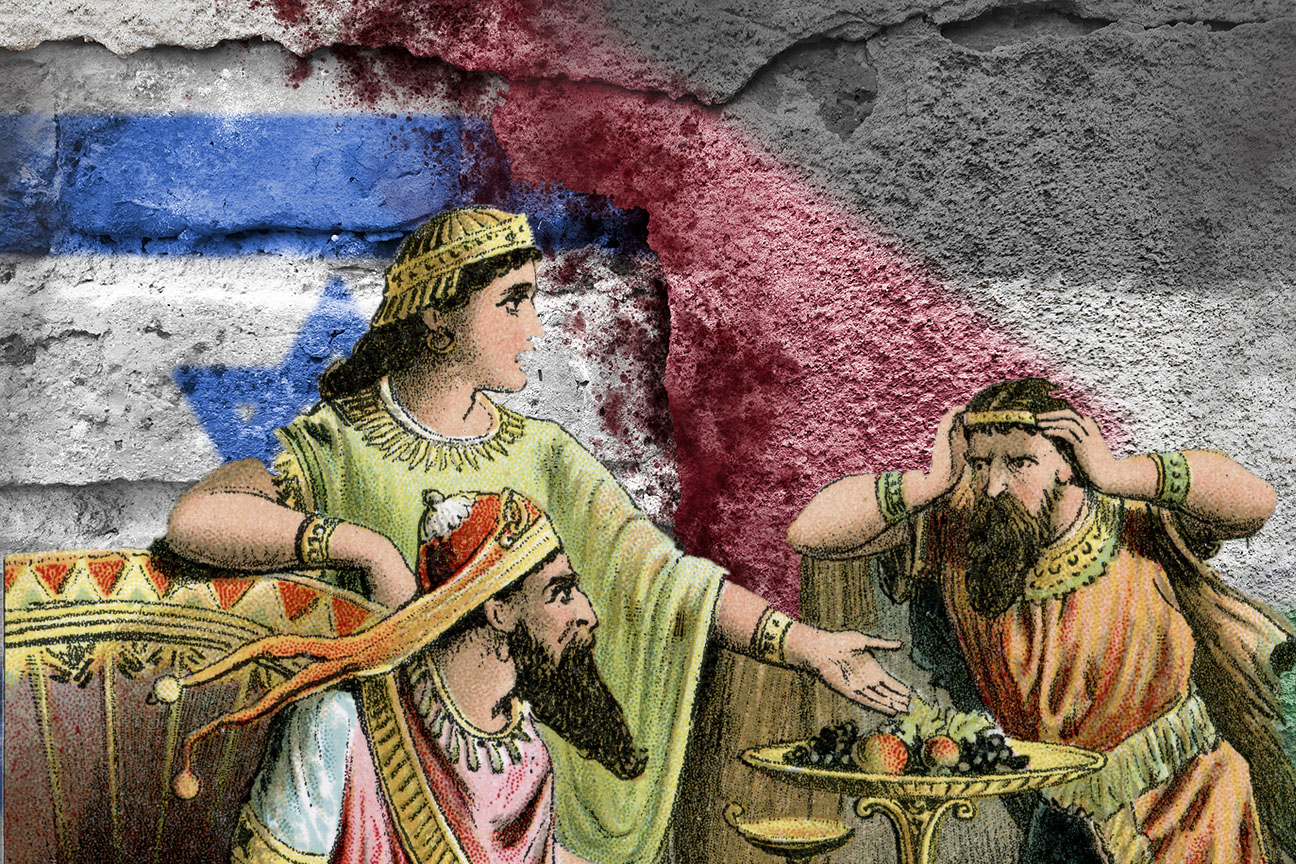 Yuliia Bukovska/Getty Images; duncan1890/Getty Images
Yuliia Bukovska/Getty Images; duncan1890/Getty Images Purim has a different resonance now, in the middle of this terrible war.
Megilat Esther is essentially a Jewish fantasy about what it would mean to be given permission to fight back. And not only that, in this fantasy, we imagine ourselves to be so ferocious and formidable a foe that everyday Persians, trembling in fear, pretend to be Jewish to avoid our terrible wrath:
“And in every province and in every city, when the king’s command and decree arrived, there was gladness and joy among the Jews, a feast and a holiday. And many of the people of the land professed to be Jews, for the fear of the Jews had fallen upon them.” (Esther 8:17)
The idea that people would pretend to be Jewish in order to preserve their own lives because the “fear of the Jews (pachad haYehudim)” had fallen upon them is meant to be funny. It’s a story told by a people so powerless that the best we can do is fantasize about a moment when we can fight back and defend ourselves. The bloody ending belies the vulnerability and powerlessness that is at the heart of the story.
I think of generations of our ancestors for whom this once a year celebration was quite literally the best they could hope for. Indignity after indignity, pogrom after pogrom, massacre after massacre, come Purim we could imagine a different world, a world turned upside down where we could be victorious and those who would seek our destruction would receive at long last their just deserts.
For a powerless, oppressed people, the mental image of our would-be destroyer, Haman, impaled on a tree was, though improbable, surely psychologically satisfying, even healing.
We are, by all measures, no longer powerless–not in America and not in Israel, our sovereign homeland. And yet, despite our return to power, there is a terrible feeling of impotence right now, following the terrible attacks of October 7. How could we have been caught so off guard on October 7? How is it, still, after five terrible months that we have not yet been able to defeat Hamas, capture Sinwar, and bring our hostages home? There seems to be no shortage of public outrage against Israel for doing what, frankly, any sovereign state would do after such a brutal attack. But where are the voices calling for the return of the more than 130 men, women, and children who were stolen from their homes?
But make no mistake, we are not powerless. To the contrary, despite missteps and failures, let us not forget our return to sovereignty. Let us remember that we are not alone in the world.
The difficulty of course of our return to power is in wielding it properly, appropriately, and morally. The heartbreaking challenge of war — this one in particular given the nature of the fighting and the depravity of our enemy — is that even if we do it well, taking great pains to avoid civilian casualties, thousands of innocents will inevitably suffer, many to their deaths. No matter that but for Hamas none of them would have been harmed. In the end, we must carry the burden of responsibility including the obligation to ensure that the basic human needs of the people of Gaza are provided.
Notwithstanding the moral challenges and the pain we feel (I can only imagine the pain that IDF soldiers endure as they do their best to achieve their mission while keeping themselves safe and avoiding civilian casualties as well), I wouldn’t trade places with our powerless ancestors who didn’t have to carry such a heavy burden for a moment. Power comes with terrible responsibility. It is messy and, at times, morally fraught.
Even in the midst of this awful war, I am grateful for our return to power even as I recognize how challenging and fraught such a privilege is. (And let us be clear: this is not a privilege for which we should ever feel the need to apologize. Countless other peoples around the world enjoy that same privilege without ever being asked to explain it. Zionism is our national liberation movementwhich we have not only the right to pursue but, given our history of persecution, the obligation as well.)
But I wouldn’t trade it for the alternative for one moment because I know the terrible consequences of such a reality and not just from the stories of our distant past of inquisitions, crusades, farhuds, and holocausts. I know it from the horrifying footage of October 7. That’s the horrifying, unbearable, intolerable image of Jewish powerlessness.
Our ancestors’ dream is still in the process of being fully realized. We still struggle with the challenge of how to wield power justly (as, I would argue, does every sovereign state on this planet). But despite the challenges, the moral difficulties, the heartbreak that comes with the inevitability of getting power wrong sometimes, I wouldn’t have it any other way.
May the day soon come when all Israel and all peoples of the world might dwell in harmony so that there might be “gladness and joy for the Jews” and all humanity.
Rabbi Yoshi Zweiback is the Senior Rabbi of Stephen Wise Temple in Los Angeles, California.























 More news and opinions than at a Shabbat dinner, right in your inbox.
More news and opinions than at a Shabbat dinner, right in your inbox.